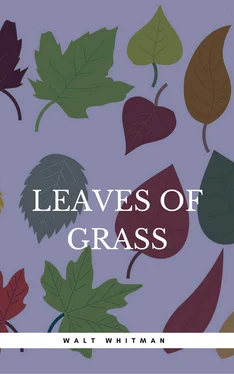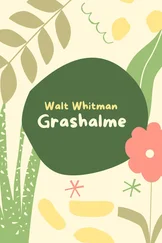Walt Whitman - Leaves of Grass
Здесь есть возможность читать онлайн «Walt Whitman - Leaves of Grass» — ознакомительный отрывок электронной книги совершенно бесплатно, а после прочтения отрывка купить полную версию. В некоторых случаях можно слушать аудио, скачать через торрент в формате fb2 и присутствует краткое содержание. ISBN: , Жанр: Языкознание, Критика, на английском языке. Описание произведения, (предисловие) а так же отзывы посетителей доступны на портале библиотеки ЛибКат.
- Название:Leaves of Grass
- Автор:
- Жанр:
- Год:неизвестен
- ISBN:9782377930524
- Рейтинг книги:4 / 5. Голосов: 1
-
Избранное:Добавить в избранное
- Отзывы:
-
Ваша оценка:
- 80
- 1
- 2
- 3
- 4
- 5
Leaves of Grass: краткое содержание, описание и аннотация
Предлагаем к чтению аннотацию, описание, краткое содержание или предисловие (зависит от того, что написал сам автор книги «Leaves of Grass»). Если вы не нашли необходимую информацию о книге — напишите в комментариях, мы постараемся отыскать её.
Leaves of Grass — читать онлайн ознакомительный отрывок
Ниже представлен текст книги, разбитый по страницам. Система сохранения места последней прочитанной страницы, позволяет с удобством читать онлайн бесплатно книгу «Leaves of Grass», без необходимости каждый раз заново искать на чём Вы остановились. Поставьте закладку, и сможете в любой момент перейти на страницу, на которой закончили чтение.
Интервал:
Закладка:
I do not affirm what you see beyond is futile—I do not advise you to stop,
I do not say leadings you thought great are not great,
But I say that none lead to greater, sadder, happier, than those lead to.
Will you seek afar off? you surely come back at last,
In things best known to you, finding the best, or as good as the best,
In folks nearest to you finding also the sweetest, strongest, lovingest,
Happiness not in another place, but this place—not for another hour, but this hour,
Man in the first you see or touch, always in your friend, brother, nighest neighbor—Woman in your mother, lover, wife,
The popular tastes and occupations taking precedence in poems or anywhere,
You workwomen and workmen of These States having your own divine and strong life—looking the President always sternly in the face, unbending, nonchalant, understanding that he is to be kept by you to short and sharp account of himself,
And all else thus far giving place to men and women.
When the psalm sings instead of the singer,
When the script preaches instead of the preacher,
When the pulpit descends and goes instead of the carver that carved the supporting-desk,
When I can touch the body of books, by night or by day, and when they touch my body back again,
When the sacred vessels, or the bits of the eucharist, or the lath and plast, procreate as effectually as the young silver-smiths or bakers, or the masons in their over-alls,
When a university course convinces like a slumbering woman and child convince,
When the minted gold in the vault smiles like the night-watchman’s daughter,
When warrantee deeds loafe in chairs opposite, and are my friendly companions,
I intend to reach them my hand, and make as much of them as I do of men and women.
5—Broad-Axe Poem
1856:5
Broad - axe , shapely, naked, wan!
Head from the mother’s bowels drawn!
Wooded flesh and metal bone! limb only one and lip only one!
Gray-blue leaf by red-heat grown! helve produced from a little seed sown!
Resting, the grass amid and upon,
To be leaned, and to lean on.
Strong shapes, and attributes of strong shapes, masculine trades, sights and sounds,
Long varied train of an emblem, dabs of music,
Fingers of the organist skipping staccato over the keys of the great organ.
Welcome are all earth’s lands, each for its kind,
Welcome are lands of pine and oak,
Welcome are lands of the lemon and fig,
Welcome are lands of gold,
Welcome are lands of wheat and maize—welcome those of the grape,
Welcome are lands of sugar and rice,
Welcome the cotton-lands—welcome those of the white potato and sweet potato,
Welcome are mountains, flats, sands, forests, prairies,
Welcome the rich borders of rivers, table-lands, openings,
Welcome the measureless grazing lands—welcome the teeming soil of orchards, flax, honey, hemp,
Welcome just as much the other more hard-faced lands,
Lands rich as lands of gold, or wheat and fruit lands,
Lands of mines, lands of the manly and rugged ores,
Lands of coal, copper, lead, tin, zinc,
Lands of iron! lands of the make of the axe!
The log at the wood-pile, the axe supported by it,
The sylvan hut, the vine over the doorway, the space cleared for a garden,
The irregular tapping of rain down on the leaves, after the storm is lulled,
The wailing and moaning at intervals, the thought of the sea,
The thought of ships struck in the storm, and put on their beam-ends, and the cutting away of masts;
The sentiment of the huge timbers of old-fashioned houses and barns;
The remembered print or narrative, the voyage at a venture of men, families, goods,
The disembarcation, the founding of a new city,
The voyage of those who sought a New England and found it,
The Year 1 of These States, the weapons that year began with, scythe, pitch-fork, club, horse-pistol,
The settlements of the Arkansas, Colorado, Ottawa, Willamette,
The slow progress, the scant fare, the axe, rifle, saddle-bags;
The beauty of all adventurous and daring persons,
The beauty of wood-boys and wood-men, with their clear untrimmed faces,
The beauty of independence, departure, actions that rely on themselves,
The American contempt for statutes and ceremonies, the boundless impatience of restraint,
The loose drift of character, the inkling through random types, the solidification;
The butcher in the slaughter-house, the hands aboard schooners and sloops, the rafts-man, the pioneer,
Lumber-men in their winter camp, day-break in the woods, stripes of snow on the limbs of trees, the occasional snapping,
The glad clear sound of one’s own voice, the merry song, the natural life of the woods, the strong day’s work,
The blazing fire at night, the sweet taste of supper, the talk, the bed of hemlock boughs, and the bear-skin;
The house-builder at work in cities or anywhere,
The preparatory jointing, squaring, sawing, mortising,
The hoist-up of beams, the push of them in their places, laying them regular,
Setting the studs by their tenons in the mortises, according as they were prepared,
The blows of mallets and hammers, the attitudes of the men, their curved limbs,
Bending, standing, astride the beams, driving in pins, holding on by posts and braces,
The hooked arm over the plate, the other arm wielding the axe,
The floor-men forcing the planks close, to be nailed,
Their postures bringing their weapons downward on the bearers,
The echoes resounding through the vacant building;
The huge store-house carried up in the city, well under way,
The six framing-men, two in the middle and two at each end, carefully bearing on their shoulders a heavy stick for a cross-beam,
The crowded line of masons with trowels in their right hands rapidly laying the long side-wall, two hundred feet from front to rear,
The flexible rise and fall of backs, the continual click of the trowels and bricks,
The bricks, one after another, each laid so workman-like in its place, and set with a knock of the trowel-handle,
The piles of materials, the mortar on the mortarboards, and the steady replenishing by the hod-men;
Spar-makers in the spar-yard, the swarming row of well-grown apprentices,
The swing of their axes on the square-hewed log, shaping it toward the shape of a mast,
The brisk short crackle of the steel driven slantingly into the pine,
The butter-colored chips flying off in great flakes and slivers,
The limber motion of brawny young arms and hips in easy costumes;
The constructor of wharves, bridges, piers, bulk-heads, floats, stays against the sea;
The city fire-man—the fire that suddenly bursts forth in the close-packed square,
The arriving engines, the hoarse shouts, the nimble stepping and daring,
The strong command through the fire-trumpets, the forming in line, the echoed rise and fall of the arms forcing the water,
The slender, spasmic blue-white jets—the bringing to bear of the hooks and ladders, and their execution,
The crash and cut away of connecting wood-work, or through floors, if the fire smoulders under them,
The crowd with their lit faces, watching—the glare and dense shadows;
The forger at his forge-furnace, and the user of iron after him,
The maker of the axe large and small, and the welder and temperer,
The chooser breathing his breath on the cold steel and trying the edge with his thumb,
The one who clean-shapes the handle and sets it firmly in the socket,
The shadowy processions of the portraits of the past users also,
The primal patient mechanics, the architects and engineers,
The far-off Assyrian edifice and Mizra edifice,
The Roman lictors preceding the consuls,
The antique European warrior with his axe in combat,
The uplifted arm, the clatter of blows on the helmeted head,
The death-howl, the limpsey tumbling, the rush of friend and foe thither,
The siege of revolted lieges determined for liberty,
The summons to surrender, the battering at castle gates, the truce and parley,
The sack of an old city in its time,
The bursting in of mercenaries and bigots tumultuously and disorderly,
Roar, flames, blood, drunkenness, madness,
Goods freely rifled from houses and temples, screams of women in the gripe of brigands,
Craft and thievery of camp-followers, men running, old persons despairing,
The hell of war, the cruelties of creeds,
The list of all executive deeds and words, just or unjust,
The power of personality, just or unjust.
Интервал:
Закладка:
Похожие книги на «Leaves of Grass»
Представляем Вашему вниманию похожие книги на «Leaves of Grass» списком для выбора. Мы отобрали схожую по названию и смыслу литературу в надежде предоставить читателям больше вариантов отыскать новые, интересные, ещё непрочитанные произведения.
Обсуждение, отзывы о книге «Leaves of Grass» и просто собственные мнения читателей. Оставьте ваши комментарии, напишите, что Вы думаете о произведении, его смысле или главных героях. Укажите что конкретно понравилось, а что нет, и почему Вы так считаете.












